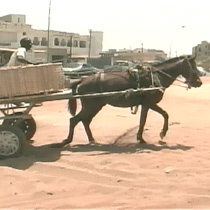2007年VOA标准英语-A Day in the Life of a Senegal Horseman(在线收听)
Dakar
13 April 2007
In the West African nation of Senegal, as in many of the poorest parts of the continent, horse carts still make up an essential part of daily life. They are used to move people, belongings and materials from place to place. VOA's Nico Colombant reports on a day in the life of one horseman in Dakar.
Horse cart driver Adama Ndoye wakes up at dawn, warms up a bit of water for his shower, kisses his newborn son and is off to work. The 28-year-old travels by bus to his outdoor workplace, which he set up several years ago. His helpers are already there, preparing the horse cart for the day.
The horse, named Diass, also appears to be awaiting the long day ahead. Before customers show up, however, a bath is in order.
The wait for customers can last a long time. Ndoye says this unpredictability can be difficult. "You do not really know how much you will make in a day or in a month,” he says. “It really depends from day to day. The last few months I do not know, I have never even calculated."
An order has finally been made to move furniture from a luxurious villa in a suburb of Dakar. This is a good job, which will pay him $10 more than usual.
 |
| Ndoye and his horse, Diass |
"It was my uncles who taught me," says Ndoye. "They taught me everything. It was so hard in the beginning since I had no experience."
Up hills the horse and driver go, through difficult terrain, until they finally arrive at the apartment to unload some of the customer's belongings.
This is also part of the job, untying knots and carrying loads, sometimes heavy. Ndoye is mainly a mover. It is just that he has a horse, rather than a truck.
"This is difficult, let me tell you,” he says. “But all work is hard."
Now it is back to his base, across the construction zone that most of Dakar has become. Moving bricks, sand and cement is good business, so Ndoye is not complaining.
The horse does not complain either, even though it only gets fed once a day, after work is over. Ndoye says he owes his horse a lot.
"Because of this job and God, I got married and I get money for rent, to feed and clothe my family, for everything," he says.
Night falls quickly in Dakar, as Ndoye locks up his work shack. He gingerly walks back in the dusk, looking for the bus that will take him home, to the family he loves and cares for – thanks to his horse.